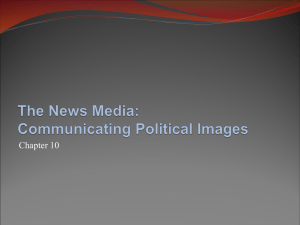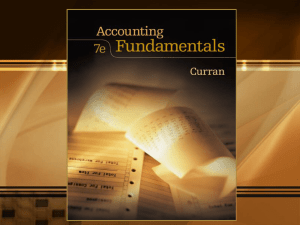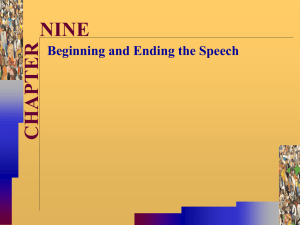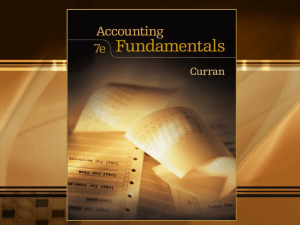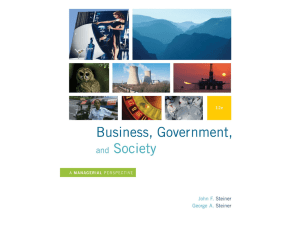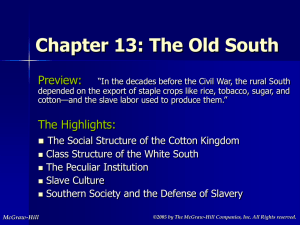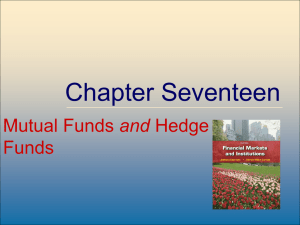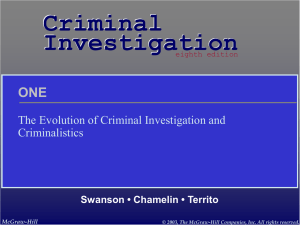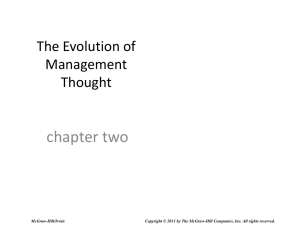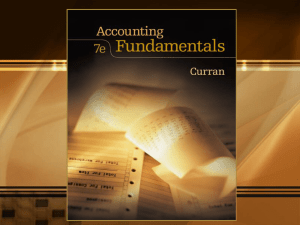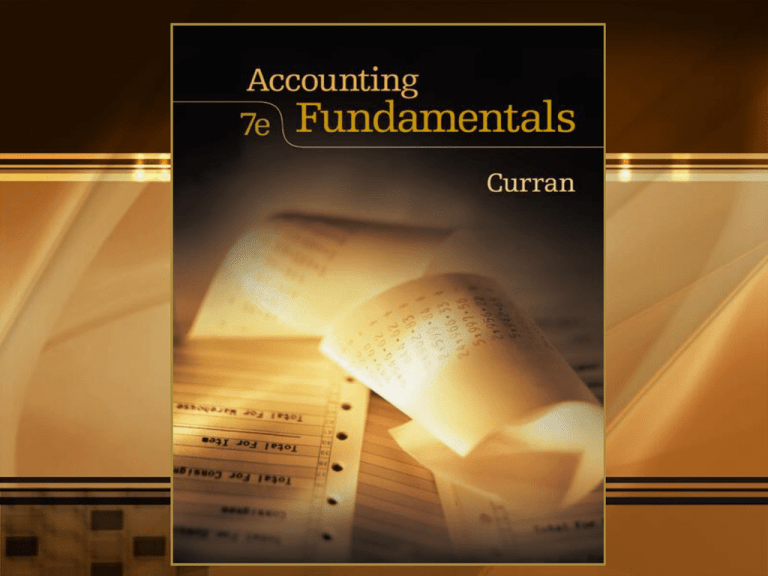
CHAPTER TWENTY FOUR
BANKING
PROCEDURES
24-3
BANKING PROCEDURES
Objectives:
1.
2.
3.
4.
5.
Open and use a checking account.
Endorse checks.
Prepare deposit slips.
Complete check stubs and write checks.
Reconcile the bank statement.
McGraw-Hill/Irwin
Accounting Fundamentals, 7/e
© 2006 The McGraw-Hill Companies, Inc., All Rights Reserved.
24-4
Opening a Checking Account
The owner of a new business should
open a checking account. Banks
require signature cards to be
completed and will accept a deposit
to open the account.
McGraw-Hill/Irwin
Accounting Fundamentals, 7/e
© 2006 The McGraw-Hill Companies, Inc., All Rights Reserved.
24-5
Making Bank Deposits
Bank deposits should be made often
to protect cash receipts.
Deposits must be prepared properly.
McGraw-Hill/Irwin
Accounting Fundamentals, 7/e
© 2006 The McGraw-Hill Companies, Inc., All Rights Reserved.
24-6
Making Bank Deposits (continued)
Coins and currency should be
counted and wrapped.
Checks and money orders must be
endorsed.
McGraw-Hill/Irwin
Accounting Fundamentals, 7/e
© 2006 The McGraw-Hill Companies, Inc., All Rights Reserved.
24-7
Writing Checks
A check gives authorization for the
bank to pay a stated amount of
money from the business’s account.
The information about the checks is
recorded in the check register or on
the check stub.
McGraw-Hill/Irwin
Accounting Fundamentals, 7/e
© 2006 The McGraw-Hill Companies, Inc., All Rights Reserved.
24-8
Writing Checks (continued)
• Checks should be numbered
consecutively.
• The check register or check stub
should be completed before the
check is written.
McGraw-Hill/Irwin
Accounting Fundamentals, 7/e
© 2006 The McGraw-Hill Companies, Inc., All Rights Reserved.
24-9
Writing Checks (continued)
• Checks should be prepared in ink,
typewritten, or printed by a
computer.
• There must be no alterations or
erasures on a check. If an error is
made, the word VOID is written in
large letters across the face of the
check and on the stub.
McGraw-Hill/Irwin
Accounting Fundamentals, 7/e
© 2006 The McGraw-Hill Companies, Inc., All Rights Reserved.
24-10
Writing Checks (continued)
• Checks must be carefully prepared
to prevent later changes in the
amount or name of the payee.
• Checks must have an authorized
signature.
McGraw-Hill/Irwin
Accounting Fundamentals, 7/e
© 2006 The McGraw-Hill Companies, Inc., All Rights Reserved.
24-11
Reconciling the Business’s Records
With the Bank Statement
Most banks send a bank statement
every month that includes the
canceled checks the bank has paid.
The bank may not know about
deposits in transit that you have
recorded.
McGraw-Hill/Irwin
Accounting Fundamentals, 7/e
© 2006 The McGraw-Hill Companies, Inc., All Rights Reserved.
24-12
Reconciling the Business’s Records
With the Bank Statement (continued)
To the balance on the bank
statement you must add deposits in
transit and subtract outstanding
checks.
To the balance in the checkbook you
must add corrections (if any) and
subtract any bank charges.
McGraw-Hill/Irwin
Accounting Fundamentals, 7/e
© 2006 The McGraw-Hill Companies, Inc., All Rights Reserved.
24-13
Reconciling the Business’s Records
With the Bank Statement (continued)
The adjusted bank balance must
agree with the adjusted checkbook
balance.
If there are errors, correcting entries
must be journalized to reflect the
corrections.
McGraw-Hill/Irwin
Accounting Fundamentals, 7/e
© 2006 The McGraw-Hill Companies, Inc., All Rights Reserved.
24-14
Other Bank Services
Banks also provide safety deposit
boxes, financial planning,
processing of sales with bank cards,
and special services that will help
you conduct your business more
efficiently.
McGraw-Hill/Irwin
Accounting Fundamentals, 7/e
© 2006 The McGraw-Hill Companies, Inc., All Rights Reserved.
24-15
Accounting Terminology
•Bank reconciliation
•Deposits in transit
•Bank statement
•Drawer
•Blank endorsement
•Endorsement
•Canceled checks
•Full endorsement
•Certified check
•Night depository
•Check
•Outstanding checks
•Check register
•Payee
•Check Stub
•Restrictive endorsement
•Credit memorandum
•Service charge
•Debit memorandum
•Signature card
•Deposit slip
•Stop payment order
McGraw-Hill/Irwin
Accounting Fundamentals, 7/e
© 2006 The McGraw-Hill Companies, Inc., All Rights Reserved.
24-16
Chapter Summary
• A well-run business deposits all its
cash receipts in a bank and makes all
cash payments by check.
• Bank deposits should be made often
to protect cash receipts. A deposit
slip must accompany the coins,
currency, and checks that are
deposited.
McGraw-Hill/Irwin
Accounting Fundamentals, 7/e
© 2006 The McGraw-Hill Companies, Inc., All Rights Reserved.
24-17
Chapter Summary (continued)
• Every check must be endorsed
before it is deposited. An
endorsement legally transfers the
right to collect payment on a check.
McGraw-Hill/Irwin
Accounting Fundamentals, 7/e
© 2006 The McGraw-Hill Companies, Inc., All Rights Reserved.
24-18
Chapter Summary (continued)
• A business must have a record of its
checks, deposits, and account
balance. This information is usually
shown on check stubs or in a check
register. The register or stub should
be completed before the check is
written.
McGraw-Hill/Irwin
Accounting Fundamentals, 7/e
© 2006 The McGraw-Hill Companies, Inc., All Rights Reserved.
24-19
Chapter Summary (continued)
• All checks should be prepared with
care and accuracy.
• Most banks send a monthly bank
statement along with canceled
checks.
McGraw-Hill/Irwin
Accounting Fundamentals, 7/e
© 2006 The McGraw-Hill Companies, Inc., All Rights Reserved.
24-20
Chapter Summary (continued)
• All accounts should be reconciled
regularly to detect any errors.
• After the reconciliation procedure is
completed, any unrecorded bank
charges or credit memorandums
must be entered in the accounting
records and checkbook.
McGraw-Hill/Irwin
Accounting Fundamentals, 7/e
© 2006 The McGraw-Hill Companies, Inc., All Rights Reserved.
24-21
Chapter Summary (continued)
• The cancelled checks should be
stored in a check file.
• Banks provide a variety of services
that are useful to businesses.
McGraw-Hill/Irwin
Accounting Fundamentals, 7/e
© 2006 The McGraw-Hill Companies, Inc., All Rights Reserved.
24-22
Investigating on the Internet
As a research assignment, access the
Wachovia Bank site and report those
sources of information that might
concern statements.
McGraw-Hill/Irwin
Accounting Fundamentals, 7/e
© 2006 The McGraw-Hill Companies, Inc., All Rights Reserved.
24-23
Topic Quiz
Answer the following true/false questions:
1. Deposits should be made frequently to
protect cash receipts.
TRUE
2. Businesses should always have a
checking account for doing business.
TRUE
3. Deposits include coins, currency, nonendorsed checks, and endorsed checks.
FALSE
McGraw-Hill/Irwin
Accounting Fundamentals, 7/e
© 2006 The McGraw-Hill Companies, Inc., All Rights Reserved.
24-24
3. Deposits include coins, currency, nonendorsed checks, and endorsed checks.
FALSE
All checks should be endorsed.
McGraw-Hill/Irwin
Accounting Fundamentals, 7/e
(Return to Topic Quiz)
© 2006 The McGraw-Hill Companies, Inc., All Rights Reserved.

